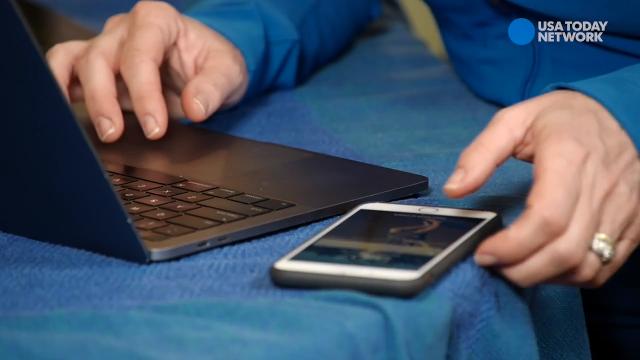
[ad_1]

How to curb that smartphone addiction
Struggling to put that smartphone down? Tech columnist Jennifer Jolly offers some tips and tools you can use to kick the habit.
During the COVID-19 pandemic, many people increasingly turned to technology for entertainment and information, a trend that raises concerns about an increase in technology addiction.
According to the Pew Research Center, about 30% of Americans are almost constantly online, which is an increase of 10% from 2015. Health officials are growing concerned about the amount of time children and adults spend with technology.
China recently banned children from playing online games for more than three hours a week, internet addiction centers have been opening in the United States and Facebook has come under fire for teenagers’ obsessive use of its Instagram app.
“There is functional, healthy engagement with technology – ubiquitous and necessary in our everyday lives – and addictive use, and it can be difficult to know when that line has been crossed,” said Petros Levounis, chair of the Department of Psychiatry and associate dean at Rutgers New Jersey Medical School and author of “Technological Addictions.”
However, while obsessive use of technology may signal an addiction, it could otherwise be a sign of another mental health disorder.”
“There are quite a lot of situations where somebody will suffer from both a technological addiction and some other psychiatric disorder, like depression or anxiety,” said Levounis. “And then what we have found is that we do need to address both issues.”
What is technological addiction?
While the majority of people who use technology will not have any problems – indeed, there are professional and recreational benefits from using electronics – a small percentage could develop an addiction and suffer consequences similar to that from substance abuse.
The COVID-19 pandemic has only exacerbated this issue. As the majority of activities have moved from in-person to virtual, this opens the door to those susceptible to technology addiction, explained Levounis.
Related: Why quitting tech and social media is harder than quitting cigarettes
Using technology can become an obsession, he said. People start engaging activities like online gaming, internet auctions, surfing the web, social media, texting or cybersex and get caught up in the excitement. Soon, the focus shifts from generating feelings of pleasure and reward to being an activity they do to avoid feeling anxious, irritable or miserable.
During the COVID-19 pandemic, cybersex has increased, with online dating apps, text chats and online pornography. Internet gaming, too, has exploded.
In May 2019, the World Health Organization made video game addiction an official mental health disorder but only a year later, “they launched a major campaign called #PlayApartTogether, promoting gaming as one of the ways of combating COVID-19,” said Lavounis.
One of the most concerning aspects of online gaming, he said, is that companies are now using psychology labs to maximize the effectiveness of their products in a way that is highly reminiscent of how the tobacco companies employed chemists to maximize their products’ addictiveness.
“If the game is too challenging for the skill level of the player, then the player becomes too anxious and quits playing. If the level of challenge is too low then the player gets bored and quits the game,” explained Lavounis.
Companies research to find the “flow zone” sweet spot where “the challenge matches the skill level of the player and exceeded by a little to drive the player to keep playing on and on and on,” he said.
What are the signs?
The two major red flags are continued use of technology despite the knowledge of adverse consequences – people say “I know it’s bad for me, but I have to keep doing it” – and lying to people who are important to you about the frequency of the activity.
But the best way to tell is to get a professional to do an evaluation. It’s important not to try to get the person into rehab to be “cured,” said Levounis.
Related: 19 things you need if you’re addicted to your phone
Find a psychiatrist, preferably one who specializes in addiction, who can evaluate the person for a variety of disorders, he said.
“That’s what we specialize in,” said Levounis. “And we can make the distinctions.”
Parents need to be good role models and be consistent in setting rules, he said. For example, it is not good for parents to declare that dinner time is a “cell phone free” time and then proceed to check emails during meals. If parents take technology out of their children’s bedrooms to promote good sleep hygiene, they should abide by these rules as well.
Email: alewis@njpressmedia.com
Alexander Lewis is an award-winning reporter and photojournalist whose work spans many topics. This coverage is only possible with support from our readers. Sign up today for a digital subscription.
[ad_2]
Source link